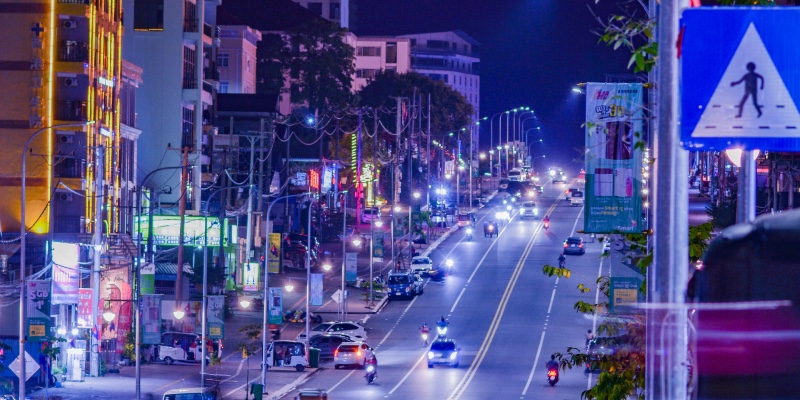The yakuza have always been pretty good at reading the room, or as they say in Japan, “reading the air”. When Japan finally decided to slam the door on their more traditional lines of work back in 2011 with a wave of laws that made it tricky to extort, traffic, or gamble without drawing a whole lot of heat, the yakuza did what all good businessmen do: they pivoted. And where did they go? Cambodia. Because, really, where better to set up shop than a place where the police are underpaid, corruption is practically a cultural pastime, and you can still buy off the local muscle with a well-timed “donation”?
It started with the basics—human trafficking, prostitution, the usual suspects. But it didn’t take long for the yakuza to level up their game. They saw Cambodia as more than just a place to smuggle and hustle. No, this tropical paradise had the infrastructure for something far more lucrative—cyber scams. The kind where you convince old ladies back in Japan that they owe money on imaginary phone bills, using a labyrinth of smartphones and anonymous bank accounts to move the money around faster than the Cambodian cops could look up from their lunch. It was a gold mine, one built on desperation, and the real stroke of genius? Using their own people as the foot soldiers.
The yakuza, a term broadly used to cover the 24 designated organized crime groups legally operating in Japan, have seen their numbers plummet in the last decade. While there were 80,000 yakuza in 2011, the number of active members is now below 24,000, according to the National Police Agency. Laws enacted nationwide in 2011 have put a serious dent in their business.
In recent years, the Japanese yakuza have expanded their criminal portfolios in Cambodia to include sophisticated fraud operations, particularly in cybercrime. These syndicates run scams involving online fraud, including phishing and investment schemes, often targeting victims in Japan or other wealthy countries. One particularly insidious practice involves holding individuals—usually fellow Japanese or other East Asian nationals—captive. These individuals are lured into Cambodia with promises of legitimate work, only to find themselves trapped in compounds where they are forced to participate in scam operations. The victims of these operations are coerced into working long hours under the threat of violence, essentially becoming prisoners of the syndicates.
The Sihanoukville Scams: A Case Study
A grim illustration of this trend came to light in early 2023 when Cambodian authorities cracked down on a transnational scam operation in Sihanoukville, arresting and deporting 19 Japanese nationals suspected of running phone scams that targeted Japanese citizens. These men were detained in poor conditions, with some claiming they were lured by promises of lucrative work but were instead trapped in grueling environments. Forced to work under threat of violence, with limited freedom and harsh treatment, these individuals were little more than slaves in a digital-age crime syndicate.
According to NHK (the BBC of Japan) and other sources, Sihanoukville, a coastal city known for its beaches and casinos, has recently gained a reputation as a hotspot for organized crime. In the case of the Japanese yakuza, the suspects were allegedly operating out of a beachside hotel. Police raids revealed an entire operation centered around sophisticated fraud schemes, in which the Japanese nationals were forced to place scam calls to elderly victims back in Japan. The scams involved impersonating government officials or lawyers, convincing their victims to transfer large sums of money to resolve fictitious legal disputes or tax issues.
In this particular case, the yakuza backed network was uncovered after a Tokyo woman in her 60s reported losing around ¥250,000 ($1800) to the scam. She was tricked into believing she had unpaid bills from NTT Docomo, one of Japan’s biggest mobile phone providers. This wasn’t a one-off. It’s estimated the group was involved in over 75 similar cases. As you’d expect, the police didn’t take too kindly to it.
Many of the perpetrators, were also victims in a sense. Forced to take part in the scam, they didn’t exactly have the freedom to stroll out and catch a tuk-tuk to the beach. One of them, desperate, sent an SOS email to the Japanese embassy in Cambodia, pleading for help. That message cracked the whole thing wide open.
The Japanese Embassy then provided key intelligence to Cambodian authorities, leading to the raid. When police stormed the hotel, they found rooms filled with smartphones, detailed manuals on how to execute the scams, and long lists of Japanese victims. The operation was meticulously organized, with each participant assigned a specific role, from making initial contact with potential victims to closing the fraudulent deals.
Sihanoukville’s transformation from a sleepy beach town to a crime haven has partly been driven by the influx of Chinese tourists and investors, who have fueled a booming casino industry. This environment—where gambling, drugs, and human trafficking intersect—provides fertile ground for organized crime to thrive.
The yakuza in Japan exist in a legal gray zone; they are regulated but not banned. Their members have business cards, and their offices are well-known. You can easily visit the brick-and-mortar headquarters of the of the Inagawa-kai or the Sumiyoshi-kai in Tokyo. They are listed on the National Police Agency web page. What happens after you knock on the door, is your problem. But being regulated and watched makes it hard to do business. Yakuza members in Japan found it extremely difficult to have a bank account, a mobile phone, or even check into a hotel. When operating in Japan becomes nearly impossible, it’s not surprising that Japanese yakuza are increasingly moving their operations overseas.
From Cambodia With Love
It should surprise no one that the Sihanoukville incident wasn’t an isolated case.
In November of 2023, 25 Japanese nationals were arrested by the Saitama Prefectural Police for their involvement in an elaborate scam operation also based out of Cambodia. The group is accused of preying on the elderly by making fraudulent phone calls from Cambodia, leading to an estimate of at least 230,000,000 yen ($1.6 million) in damages across at least eight prefectures in Japan. In a statement that speaks to the psychological toll of their criminal activities, some of the suspects reportedly expressed relief at being caught, because they were working against their will.
The suspects, aged between 20 and 42, were arrested after being deported from Cambodia, where they had been detained in September of 2023. The group allegedly orchestrated several scams, including one in which they convinced a woman in her seventies, residing in Hokkaido, to part with ¥450,000 under the false pretense of resolving a fictitious dispute over nursing home admission. These individuals, it is believed, served as the “callers,” placing deceitful calls to their Japanese victims from their base in Cambodia.
The group had set up shop in an eight-story apartment building in Cambodia, reserving an entire floor as a dedicated calling center. When the authorities raided the premises, they discovered over 100 smartphones and computers, along with lists containing the phone numbers of elderly individuals, records of victims’ personal details, and other materials that pointed to an organized effort to manage the scam meticulously.
Adding another layer of intrigue to the operation, it was revealed that the scam-related paperwork was printed on water-soluble paper, presumably to enable the rapid destruction of evidence if necessary. The police are now delving deeper into the group’s operations, attempting to untangle the command structure and determine the identities of those who masterminded the scheme.
The conditions under which these individuals were operating in Cambodia are slowly coming to light. Statements from some of the suspects paint a bleak picture: long hours of work from 9 AM to 7 PM with only an hour’s break, limited freedom of movement, and substandard living conditions.
This case underscores the growing trend of Japanese scam operations relocating abroad, particularly to countries like Cambodia, where law enforcement can be more easily circumvented. The reasons behind this shift are multifaceted, including Japan’s increasingly stringent crackdown on domestic fraud rings and the relatively lax oversight in countries like Cambodia or the Philippines.
How did they get there?
But what are a bunch of Japanese criminals doing in Cambodia anyway? Well, if you follow the breadcrumbs, it leads you back to Japan’s underworld—the yakuza. According to an investigator in the Saitama Prefectural Police, at least one key figure in this scam ring had ties to a designated organized crime syndicate in Kyushu, specifically an affiliate of the notorious Kudo-kai. Other members included former gangsters in the Yamaguchi-gumi, Japan’s third largest organized crime group.
Japan’s yakuza started planting their roots in Cambodia around 2010, after new laws in Japan made their traditional business models less sustainable. Cambodia, a land where bribery and corruption run rampant, was the perfect escape. There is one former yakuza in the Yamaguchi-gumi, Japan’s largest organized crime group, who told me of personally witnessing senior yakuza figures wining and dining Cambodian officials in 2017, doing what they do best—using cash to buy off the muscle, be it the police or the military. They are adept at using the promise of “candy or the whip” to get what they want.
And it’s not just the foot soldiers setting up shop. Some of the most powerful retired yakuza bosses have been known to relocate there, too. Leading the way was, notorious Tadamasa Goto, once a major player in the Yamaguchi-gumi, also found his way to Phnom Penh in 2010, where he set up a criminal empire.
(Note: Details of why this happened are covered in Tokyo Noir (Scribe Publications).
The US Department Of Treasury took notice of his newfound career as a Cambodia-based mafia boss and put Goto on a black-list. In December 2015, the U.S. The Treasury’s Office of Foreign Assets Control (OFAC) sanctioned Goto for his involvement in transnational criminal activities. Despite his expulsion from the gang in 2008 and subsequent relocation to Cambodia, Goto was accused of continuing to launder money and support yakuza global operations. This action froze Goto’s assets held in the U.S. and prohibits U.S. citizens from engaging in any financial dealings with him. It was part of a broader effort by the U.S. to target transnational criminal organizations under an executive order signed by President Obama in 2011, reinforcing the international pressure on organized crime groups operating across borders.
This move by OFAC served as a clear signal that U.S. authorities were closely monitoring global organized crime networks and their supporters, no matter where they operated. It also should have been a warning.
That was almost ten years ago. The seeds of crime bear bitter fruit, indeed.
The Role of Cambodian Corruption
At the heart of this problem is Cambodia’s systemic corruption. Law enforcement in the country is weak, with many officers underpaid and overworked. As a result, criminal syndicates like the yakuza can operate with near impunity. In some cases, Cambodian officials are directly involved in the criminal operations, taking bribes to turn a blind eye or actively assisting in the cover-up of illicit activities. This environment allows the yakuza to expand their operations, diversify their criminal portfolios, and continue preying on vulnerable populations, both in Japan and in Cambodia.
The problems in Cambodia are so deeply rooted that even the U.S. has taken notice. This September (2024) The U.S. Treasury Department imposed sanctions on Ly Yong Phat, a powerful Cambodian tycoon. These sanctions are part of a broader effort to target human rights abuses, specifically related to human trafficking and forced labor tied to the online scam industry in Cambodia. Ly Yong Phat’s O’Smach Resort has been implicated in these operations, with victims reporting being lured with false job offers and then forced to participate in online fraud schemes, such as cryptocurrency scams, once their phones and passports were confiscated.
The State Department has also expressed deep concern over the rising prevalence of cyber scamming and human trafficking in Cambodia. In its 2024 Trafficking in Persons Report, the department highlighted how Cambodian government officials have been complicit in these operations, often protecting or profiting from the scam compounds. The State Department emphasized that Cambodia’s scam centers, like those operated by Ly Yong Phat, are responsible for systematic human rights violations, and that the U.S. remains committed to disrupting these operations and holding responsible parties accountable through sanctions and other measures.
As Cambodia becomes a new frontier for organized crime, the lines between human trafficking, fraud, and drug smuggling blur. The yakuza, long known for their structured and hierarchical operations, have evolved into a more opportunistic organization, capitalizing on the weaknesses of countries like Cambodia to build transnational networks. And they know the right people to bribe.
For Japan, this presents a serious challenge, as its citizens are increasingly caught in the crossfire of these criminal activities, both as victims and as unwilling participants. Combating this transnational threat will require not only stronger domestic policies but also international cooperation, particularly in countries like Cambodia, where the yakuza have found fertile ground to grow their operations. Cambodia’s transformation into a hub for organized crime is a reflection of how globalized the yakuza and other syndicates have become.
By the way, if you’re thinking of taking a holiday in Cambodia, or considering a lucrative job offer to work there, think again. It’s the Wild West of Southeast Asia right now and unless you’re a gunslinger, it’s not the place to hang your hat. If you’re a ruthless yakuza with a yen for big profits, it may be your Shangri-La.
***
Sources:
- 元暴力団トップ、タダマサ・ゴトのカンボジアでのビジネス” (Yomiuri Shimbun, 2003).
- カンボジアで日本人拘束、詐欺組織に関与か” (Asahi Shimbun, 2023).
- US State Department
- Treasury Sanctions Cambodian Tycoon and Businesses Linked to Human Trafficking and Forced Labor in Furtherance of Cyber and Virtual Currency Scams
- S. Department of the Treasury
- OFAC Sanctions Prominent Japanese Yakuza Member
- US Sanctions Yakuza Boss Living in Cambodia


















